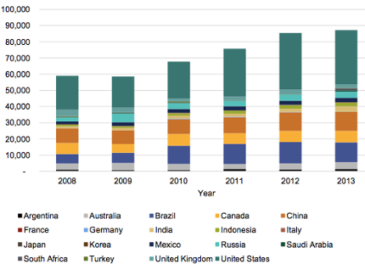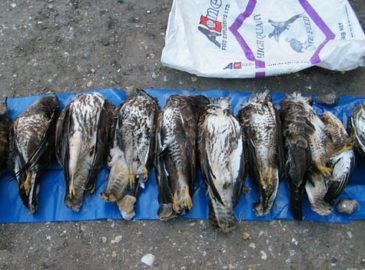The Southern Ocean plays an important role in the exchange of carbon dioxide between the atmosphere and the ocean. One aspect of this is the growth of phytoplankton, which acts as a natural sponge for carbon dioxide, drawing the troublesome greenhouse gas from the atmosphere into the sea. When these plankton die they can sink…
ReadEnvironmental News

Rich countries are subsidising oil, gas and coal companies by about $88bn (£55.4bn) a year to explore for new reserves, despite evidence that most fossil fuels must be left in the ground if the world is to avoid dangerous climate change. The most detailed breakdown yet of global fossil fuel subsidies has found that the…
ReadA plane lands at Gatwick airport. Analysis says its expansion plans would cause less noise and be easier to construct than Heathrow’s. Photograph: Gareth Fuller/PA New runways at Gatwick and Heathrow will cost more than the airports claim, meaning higher airport charges and likely higher fares for passengers, according to an analysis published by the…
ReadGovernments are lagging behind on international commitments to safeguard the planet’s ecosystems, with politicians failing to grasp that economic growth depends upon environmental protection, the head of the world’s leading conservation organisation has warned. Julia Marton-Lefèvre, director general of the IUCN, the body that advises the United Nations on environmental matters, told Guardian Australia that…
ReadThe head of the world’s leading conservation organisation has criticised the Australian government’s attempt to strip world heritage protection from Tasmania’s forests, as new data laid bare the vast number of ecosystems in Australia at risk of collapse. Julia Marton-Lefèvre, director general of the IUCN, the body that advises the United Nations on conservation matters,…
Read
A gamekeeper convicted of “the worst case of bird of prey poisoning” recorded in England has been given a 10-week suspended sentence. Allen Lambert, 65, who worked on the Stody Estate, near Holt in Norfolk, was found guilty of deliberately killing 10 buzzards and a sparrowhawk. Head of RSPB investigations Bob Elliot said the discovery…
ReadSexual deceit, pressed flowers and Victorian bee collectors are combined in new scientific research which demonstrates for the first time that climate change threatens flower pollination, which underpins much of the world’s food production. The work used museum records stretching back to 1848 to show that the early spider orchid and the miner bee on…
ReadGerman ambitions to generate the vast majority of its power from the sun, wind and other renewable sources by the middle of the century are at risk from cuts to solar subsidies and weak EU clean energy targets, industry and experts say. The country’s target of getting 80% of energy from renewable sources by 2050…
ReadThe Texas town where America’s oil and natural gas boom began has voted to ban fracking, in a stunning rebuke to the industry. Denton, a college town on the edge of the Barnett Shale, voted by 59% to ban fracking inside the city limits, a first for any locality in Texas. Organisers said they hoped…
ReadCan a strategy that fails to address the issue of pesticides and lacks targets on habitat restoration prove effective? Karl Mathiesen investigates. The government’s strategy for protecting pollinating insects, including bees, fails to adequately address one of the major threats to their health say scientists, environmentalists and opposition politicians. The national pollinator strategy (NPS), launched…
Read


